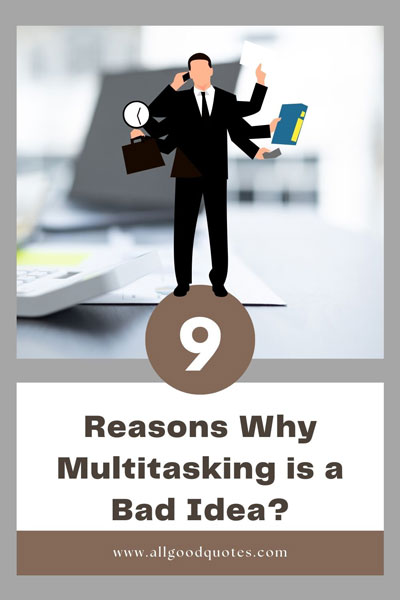Employers adore multitasking, and most people would love to develop it as a skill. But is multitasking actually something to strive for, and is it ultimately detrimental to productivity?
Humans can hardly ever sit down and complete a single task at a time. We get out of breath when we switch between different tasks. We experience one of those days when we feel overly busy but accomplish very little. Why are we so bad at sitting down and concentrating on one thing while we watch television while we read?
What do we mean by multitasking?
It is actually carrying out several tasks at once.
Or
It is more like task switching, where you work on something for a while before moving on to something else even though you didn’t finish the first?
No one appears to be quite certain, although a lot of us think that multitasking is good quality.

There are 9 Reasons Why Multitasking is a Bad Idea?
1. You’re moving more slowly as a result.
Contrary to what many people think, multitasking doesn’t save time. In fact, if you switch between two projects, it will probably take you longer to complete them than if you worked on them alone. Every activity requires a particular mindset, so once you settle on one, stick with it until the task is completed.
2. More errors result from multitasking.
More Tasks is directly proportioning to More Mistakes.
Your attention is split between the tasks you are completing at once, therefore it makes sense that you will make more mistakes. Furthermore, multitaskers are poor at filtering out irrelevant information, according to Stanford studies. That implies that some mental cross-firing and task overlap are inevitable.
3. Anxiety Is Increased by Multitasking
Employees’ pulse rates while using and not using business email.
Those who had access to their emails continued to be wired; their heart rates were higher than those who did not.
The second group, on the other hand, was seen to work relatively stress-free.
Also Read: 10 Golden Words for Life
4. Creativity Is Stopped
You will never have enough working memory if you focus on too many things at once to come up with truly original thoughts and concepts. Yes, you will do your projects at a standard pace and level of detail, but greatness will be out of your reach.
5. It negatively impacts productivity.
There is merely rapid switching between tasks; there is no actual multitasking.
Your performance and productivity are affected when you switch between tasks.
In most circumstances, it takes some time for our brain to get warmed up for a task. Therefore, balancing multiple tasks at once doesn’t leave enough time.
6. Multitasking is harmful to the brain.
According to research, multitasking harms the brain in addition to making it difficult to concentrate. In a study, University of London researchers discovered that participants who multi tasked while doing mental tasks suffered from a loss in IQ that was comparable to what they might have anticipated if they had taken marijuana or remained up all night. Men who multitask had IQ losses of 15 points, bringing their results to that of an 8-year-old on average. So the next time you’re in a meeting and trying to write your boss an email, keep in mind that your ability to think clearly is being compromised to the point that you might as well let an 8-year-old write it for you.
7. Multitasking breaks the rhythm
When the brain is in a state of flow, it is operating at its highest level and disregarding the majority of external factors because it is so focused on the task at hand. Working on a task that is both interesting and manageable for one’s skill level is necessary for inducing flow. Multitasking interrupts the flow of work and negatively impacts productivity.
8. Focus is more readily lost.
Your productivity and performance will suffer if you multitask because your brain can only concentrate on one thing at a time. Your brain cannot successfully complete two activities when you attempt to accomplish them both at once.
9. You Won’t Recall As Much
Multitasking can hinder your attempts to learn anything new or to just recall what your friend said. “Divided attention reduces encoding, and encoding is the first step in remembering,” says Dr. Merrill (MD, PhD, adult and geriatric psychiatrist and director of the Pacific Neuroscience Institute’s Pacific Brain Health Center at Providence Saint John’s Health Center in Santa Monica).
Conclusion
These are the reasons why multitasking is a bad idea. Last but not least, we would have to agree that our work is considerably higher quality when we are concentrating completely on something without interruptions or task switching. Being present and focused on the task at hand is the key to being more productive, as meditation and mindfulness tell us.

